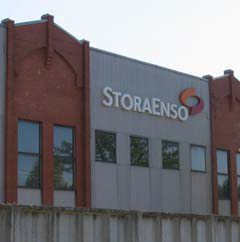
How does a company manage 1 box plant/sheet feeder in Latvia, a warehouse in Lithuania (near Poland), 1 sheet plant in central Lithuania, and 2 sheet plants in Estonia when 4 languages and 5 different currencies are involved? Also with distances for shipping finished product ranging up to 600Km and crossing several borders, how do they deal with the complexity of the sales transactions? Stora Enso Group and Kiwiplan found the answer.
Stora Enso is an integrated paper, packaging, and forest products company, producing publication and fine paper, packaging board, and wood products—all areas in which the Group is a global market
leader. In 2005, Stora Enso’s sales totaled EUR 13.2 billion. The Group has some 46,000 employees in more than 40 countries on five continents. Stora Enso serves its mainly business-to-business customers
through its own global sales and marketing network. A global presence provides local customer service. And, that is only part of the story.
With its corrugated packaging facilities in the fast-growing eastern European countries of Latvia, Estonia, and Lithuania, Stora Enso’s management team is faced with distinct issues related to serving the
local market. Designed to operate in complex environments, Kiwiplan’s comprehensive suite of automated Manufacturing Execution Systems (MES) and the fully integrated Enterprise Sales Processing (ESP) costing estimating system was the exact business solution required by Stora Enso.
Kiwiplan managed a full system configuration for both the hardware and the network of a multi-plant scenario with all locations in one database. Complete with a project plan, the installation of all the Kiwiplan products was a successful joint effort involving the Baltic Stora Enso management team and Kiwiplan project management. The project included interfacing with their financial system at multiple levels to achieve a seamlessly integrated solution.
Immediately Stora Enso management gained critically important visibility throughout their entire enterprise—visibility of not only real-time statistics, but total visibility with the Factory Floor Feedback module, including plant capacities and bookings for all their facilities down to current runnings on any given machine.
Additional benefits became apparent very quickly. Work cards, print designs, and construction designs are printed only when necessary and then on-demand. This prevents errors and ensures that only the current specifications are used by the crews. Tooling is managed with a central design group, thus allowing visibility and transference of orders with tooling to the desired manufacturing facility to ensure ontime delivery and customer satisfaction. Kiwiplan B2B links between sites provide real-time information of order status amongst the many sites. In addition to the tools to actively manage the plants, Kiwiplan provides customized and detailed reports for sales, financial, logistic and production needs. The reports summarize information at the business level and can easily be broken down into analysis segments.

That is just the beginning. ESP’s customized costing/pricing replaced the heavily maintained Excel spreadsheet at the sheet plants. Aija Skeltina, Baltics Logistics Director at Stora Enso, comments, “Inventories are now immediately visible, more importantly 100% track-able. Automation has occurred not only throughout our manufacturing processes, but we are also able to take advantage of automated order and customer-specific order confirmations via email. Additionally, ESP suggests due date and time based on plant availability. And with our seasonal swings, the inventories are now managed by ESP via a built-in TopUp process.”
What difference does all of this make? Andis Skujenieks, Baltics Sales and Marketing Director concludes, “The Stora Enso Riga plant has seen a significant volume growth—it doubled in 2 years. Other expansion plans are in the works. Most importantly, the Stora Enso team is able to oversee and properly manage their plants— proactively and completely—and this would not be possible without Kiwiplan.” That is the story the Stora Enso team had hoped for and was able to achieve.